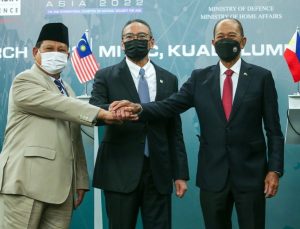Last month, the defense ministers of Indonesia, Malaysia, and the Philippines reiterated the potential for expansion of trilateral patrols in the Sulu Sea. While prospective expansion is far from new, it has nonetheless spotlighted the ongoing development of one of the key minilateral mechanisms in the subregion.
As I have observed before, while headlines about maritime security in Southeast Asia are often focused primarily on waterways such as the South China Sea or the Malacca Straits, the Sulu-Sulawesi Seas – or, more specifically, the one million square kilometer tri-border area between the southern Philippines, Indonesia, and Malaysia – has been the focus of intensifying defense cooperation in order to stem transnational organized crime and terrorist threats. Following a spate of kidnappings by militant groups in mid-2016, the three countries forged a Trilateral Cooperative Agreement (TCA) in 2017 and into 2018, with maritime and air patrols and the setting up of hubs for operations in each country.
As the initiative took off, it sparked conversations about future ways to intensify aspects of the TCA – be it the types of operations being conducted, the number of interactions between the three governments, and even potential expansion to include other countries. While many trilateral activities were suspended or scaled down during the pandemic in 2020, their gradual resumption over the past few months has once again revived discussions on this front.
On March 28, the holding of an in-person TCA ministerial – the first meeting since the pandemic began – saw the three sides make some progress on this front. The engagement took place in Kuala Lumpur as Malaysia also held the Defense Services Asia (DSA) exhibition and National Security Conference Asia (NATSEC). Public statements and remarks suggested that the three defense ministers agreed to increase the intensity and frequency of interactions between them and would consider broadening TCA’s membership to include other Southeast Asian countries.
Specifically, per a press release issued by Indonesia’s defense ministry, all sides had agreed to speed up the implementation of trilateral maritime exercises in areas of mutual concern; strengthen intelligence-sharing to facilitate future TCA surveillance operations; and expedite the deployment of trilateral maritime patrol liaison officers to designated maritime command centers in Tawau, Malaysia; Tawi-Tawi, the Philippines; and Tarakan, Indonesia. Remarks by Malaysian Defense Minister Hishammuddin Hussein and Philippine Defense Secretary Delfin Lorenzana suggested that other ideas had also been under consideration, including the annualization of TCA ministerials, exploring the potential of land-based exercises headed by chiefs of defense forces, expanding patrols to include 24-hour coverage with faster ships and reconnaissance aircraft, and perhaps even including observer countries such as Brunei.
Such moves would be significant. Annualizing ministerial meetings and regularizing interactions between points of contact at maritime command centers would help further institutionalize the TCA across various levels, which had been an important ingredient in the success of some other previous minilateral mechanisms such as the Malacca Straits Patrols, which kicked off in 2004. And including other Southeast Asian countries to varying degrees, even in an observer capacity, could continue developing an understanding among countries about how they might plug in to the mechanism where it is most useful.
At the same time, these suggestions will also face their share of challenges. Deepening or broadening the TCA will involve tradeoffs each country will have to make, which relates not just to military feasibility but also to managing contemporary interagency dynamics and historical sensitivities that remain. The TCA will also be evolving during the natural cycles of domestic politics in each of the three countries, which can affect prioritization in their wider security outlooks. The Philippines is heading into presidential elections in May, snap polls are looming over Malaysia’s political landscape, and Indonesia is already gearing up for campaigning for its 2024 general elections.
More broadly, whatever successes these patrols achieve, they will not address the root causes of the transnational challenges they are meant to solve unless they are paired with non-military measures to tackle governance concerns within these countries themselves, be it uneven economic development or persistent corruption.
This is not to understate the TCA’s success to date. Indeed, data cited from officials as well as from institutions like the Regional Cooperation Agreement on Combating Piracy and Armed Robbery Against Ships in Asia (ReCAAP) have shown some decreases in recorded incidents of transnational crime in previous years. But even so, headline developments on the future evolution of the TCA ought to be viewed from a broader perspective that takes into account subnational, domestic, and regional realities.

































